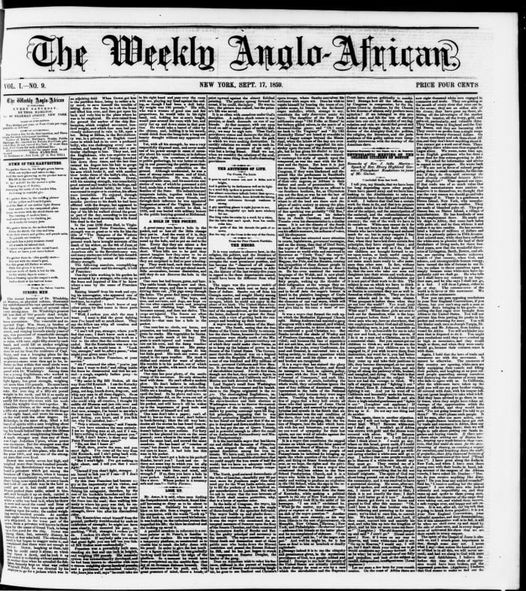GM – FBF – Today’s American Champion organization were perhaps the most influential African-American journals of the late 1850s and the Civil War era. They were unique in that they served as forums for debate rather than simply reflecting the views of the publisher.December 24,1865 – The Weekly Anglo-African newspaper and the Anglo-African magazine folded. The Weekly Anglo-African newspaper and the Anglo-African magazine were perhaps the most influential African-American journals of the late 1850s and the Civil War era. They were unique in that they served as forums for debate rather than simply reflecting the views of the publisher. They were owned by the journalist Thomas Hamilton (1823–1865), the son of New York City community leader William Hamilton. He and his brother Robert were the editors.The Weekly Anglo-African, whose first issue was dated July 23, 1859, was a four-page weekly, with seven columns of large type to a page. It cost four cents per copy, with a yearly subscription price of two dollars. Its motto was “Man must be free; if not through the law, then above the law.” Unlike most black newspapers of the time, which published only a few issues before folding, the paper was an almost immediate success. It came to be respected for its sophisticated analysis of issues such as violent resistance to slavery, the ramifications of the Dred Scott Decision, and John Brown’s Raid.The Anglo-African magazine, a thirty-two-page monthly with a yearly subscription price of one dollar, began on January 1, 1859. It was one of the first illustrated African-American publications. Its prospectus proclaimed that the magazine was devoted to the cause of literature, science, statistics, and the advancement of the cause of freedom. Among its other features were biographies of outstanding figures such as actor Ira Aldridge, evaluations of the abolitionist cause, comic prose, and fiction.Many leading black writers and abolitionists, including Martin R. Delany, Frances Ellen Watkins Harper, J. W. C. Pennington, and James Theodore Holly, were frequent contributors to the journals.Other luminaries, such as Frederick Douglass, William Cooper Nell, Mary Ann Shadd Cary, Daniel Payne, and John Mercer Langston, wrote occasional pieces. The Anglo-African magazine, and later the Weekly Anglo-African, serialized Delaney’s novel Blake: or, The Huts of America, one of the first African-American novels (it was not printed in book form until 1970). Hamilton also was a book publisher. His list included such books as Robert Campbell’s A Pilgrimage to My Motherland: An Account of a Journey among the Egbas and Yorubas of Central Africa, 1859–1860 (1861) and William Wells Brown’s The Black Man: His Antecedents, His Genius, and His Achievements (1863).By early 1860, despite their critical success, the Hamiltons developed severe financial problems. The Anglo-African magazine ceased publication, and they sold the Weekly Anglo-African to James Redpath, a prominent white abolitionist and emigrationist. By fall 1861 they had regained control, with Robert Hamilton handling the business affairs. The radical abolitionist Henry Highland Garnet, named “Editor of the Southern Department,” reported on events in Washington. During the Civil War, the paper covered war news and carried messages from black soldiers. Hamilton became a fervent supporter of the Republican Party, although he remained critical of northern discrimination. On March 29, 1862, he warned that northern prejudice was a “strong impediment” to black advancement. Hamilton and Garnet called for citizenship and proper education for freedmen. On September 9, 1865, in one of the paper’s last issues, Hamilton praised and defended northern black teachers who went south, claiming such work was blacks’ chief responsibility and greatest service. The newspaper folded in December 1865. Research more about this great American Champion event and share it with your babies. Make it a champion day!

